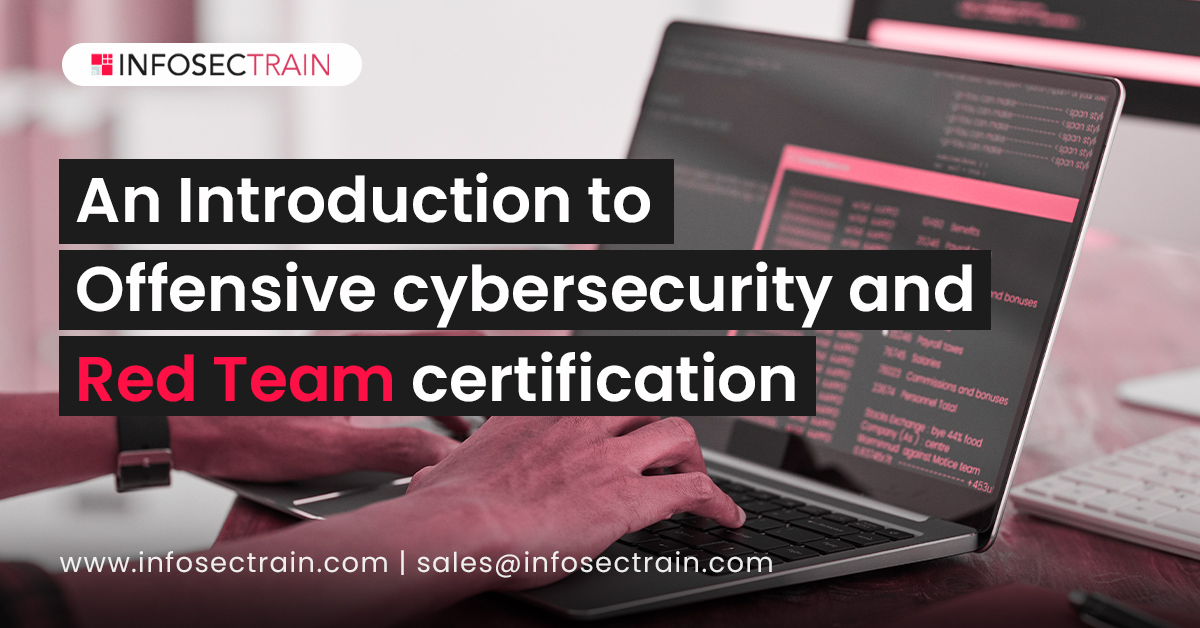An Introduction to Offensive Cybersecurity and Red Team Certification
Cybersecurity is a practice of guarding data, services, networks from threats, attackers, and hackers in the form of digital attacks. These digital attacks are called cyberattacks which are generally aimed to access, modify or destroy sensitive data. Cyber attackers not only try to get money from the users but they also interrupt the usual business process.

In simple terms, Cybersecurity guards the data and integrity of computing assets that are connected and belong to a particular organization’s network. The whole purpose of cybersecurity is to protect these assets against threats throughout the complete cyber attack lifecycle.
Let us see a few advantages of maintaining cybersecurity:
1. You can protect your information and networks from attacks.
2. You can enhance the company credentials with the proper security controls.
3. With cybersecurity, companies can enhance their business continuity management and information security.
4. With proper cybersecurity, all the shareholders will believe in your company.
What is offensive cybersecurity?
Offensive Cybersecurity, also known as hacking back, refers to the proactive attack on hackers to disrupt their operations and defend our information against future attacks. The offensive cybersecurity team, referred to as RED TEAM, can seize the cyberattacks even before penetrating cyber defenses or damaging the target systems.
As mentioned, Offensive Cyber Security, which is also referred to as the Red Team, educates the clients. The Red Team identifies the security threats. They also notify you about Intelligent business decisions and allow you to eliminate your attack surface socially, physically, and digitally.
The Red Teams are independent of the companies and are only hired when organizations are willing to check their defenses. The team consists of ethical hackers who will carefully check the vulnerabilities in the system and safely exploit them.
Typical Red Team Duties include:
- Red teams must be able to avoid the blue team’s attention. Red teams must be able to identify the system vulnerabilities.
- Compromising the target system’s security by retrieving the data and breaching its physical parameters or infiltrating the system.
- Employing vulnerabilities and bugs into the target’s infrastructure. This process highlights that organizations’ technical security must be fixed.
- Initiating antagonistic activities.
The Red Teams methods to attack organizations are:
- Initial resonance – Open-Source Intelligence (OSINT) for retrieving the data from the target.
- Read Teams must utilize tricks to throw the blue teams out of the scent.
- Using phishing and social engineering techniques to manipulate the employees to reveal and expose the data.
- Digital penetration and physical testing.
Now, let us see the Offensive Cybersecurity and Red Team certification details:
Before even going into the certification, let us see the prerequisites:
- One of the essential prerequisites of the Offensive cybersecurity exam is to complete the penetration testing with the kali Linux course that offensive security offers.
- You must have a good understanding of the TCP/IP networks.
- You must have a good understanding of Linux.
- You must have excellent scripting skills, whether it is Python or Perl.
- You must know passive information gatherings like Google hacking or email harvesting.
- You must know active information gatherings like DNS tactics, SNMP tactics, and port scanning.
And you must additionally have the knowledge of
- Working with exploits
- Web application attacks
- Buffer overflows
- Port redirection
- Client-side attacks
- Passwords attacks
- Metasploit frameworks
- Privilege escalation
- Bypass antivirus software
Just by seeing prerequisites, you can get the idea of how hard it is to get the offensive cybersecurity certification but with hard work and good guidance like Infosec Train, you can clear the exam.
The best part about OSCP certification is that there is no expiry date for the OSCP certificate.
Who can take up the certification?
Cybersecurity professionals who are in the following areas or willing to work in the future will be benefited from this certification, and the work areas are:
- Cybersecurity consultants→ are experts who are within a consulting role associated with offensive security and cybersecurity.
- System auditors→ are experts whose job is to perform cybersecurity audits of systems.
- Penetration testers→ are experts whose job is to perform offensive tests or ethical hacking against the systems.
- Advanced security professionals→ are experts with security or cybersecurity job tasks like network security engineers, cybersecurity analysts, and incident responders.
Suggestion:
OSCP is a challenging penetration testing certification for expert penetration testers, so if you want to be a senior penetration tester, you will have to attend this certification exam at some point in your career. So, you have to be prepared for it.
Make sure to attend this exam with high knowledge of Linux, python, and kali. If you have failed this exam, you can also go for CEH and PenTest+ Certification Training that are pretty doable with no extra effort.
Key points:
- OSCP certification is an advanced certification that will enhance your career opportunities.
- The certification exam itself is one of the most meticulous cyber security-based certification exams possible but has a very solid status amidst penetration testers.
- Aspiring penetration testers with comparatively less experience can go for CEH or PenTest+ certifications.
Offensive Cybersecurity training with Infosec Train:
InfoSecTrain is one of the best globally recognized training platforms focusing on Information security services and IT security training. Enroll in our Offensive Cyber Security Training course to experience the practical sessions and excellent training from the best trainers.








 1800-843-7890 (India)
1800-843-7890 (India)